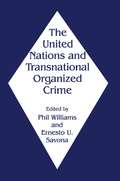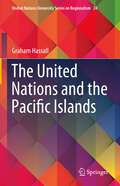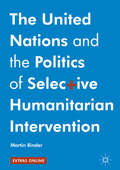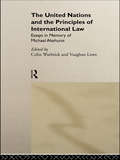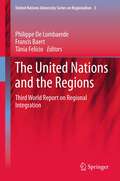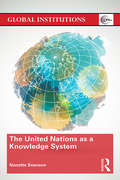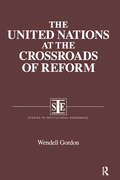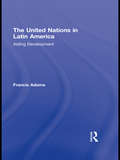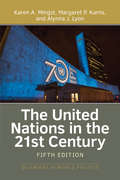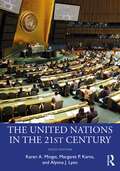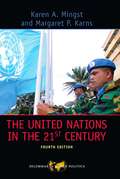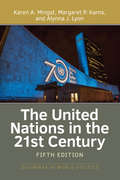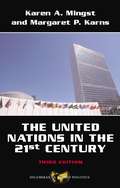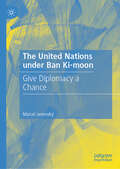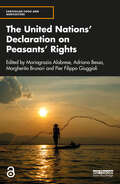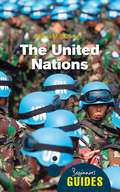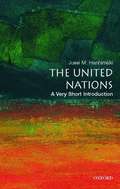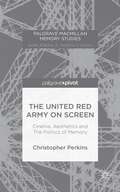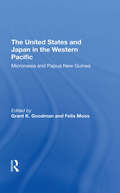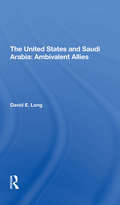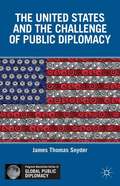- Table View
- List View
The United Nations and Transnational Organized Crime
by Phil Williams Ernesto U. SavonaTransnational organized crime poses a serious threat to the international community. This volume, the product of a UN conference, discusses the dangers of transnational organized crime and identifies forms of regional, national and international co-operation for its prevention and control, including intelligence networks, preventive strategies, extradition treaties, criminalizing participation in criminal organizations and the elaboration of an international convention. The reduction and subsequent containment of transnational organized crime require governments not only to recognize the seriousness of the challenge, but also to allocate resources commensurate with this challenge. The authors warn that should the international community fail to do this, the prospects for democratic government and the rule of law will be gloomy.
The United Nations and the Pacific Islands (United Nations University Series on Regionalism #24)
by Graham HassallThis book critically examines the relationship between the United Nations Organization and the small states of the Pacific islands. It provides an in-depth coverage of the United Nations, coupled with how Pacific Small Island Developing States interact. It covers three themes, the first one being the position of the UN on the Pacific Islands, which examines the role of the many UN organs, agencies and programs in strengthening individual countries and the region as a whole. It examines the manner in which the UN’s activities have benefited Pacific nations, territories and peoples. The second theme deals with the Pacific states in the UN, and examines the participation of Pacific nations and territories in the UN’s various organs, agencies, and programmes. It analyses the contribution they have made to the effectiveness of the organization, as distinct from the benefits they have sought to gain from it. The third and last theme deals with small states in global public policy, taking a broader look at how small states are faring within the UN system in the age of global discourse on shared public goods/public policy concerns.
The United Nations and the Politics of Selective Humanitarian Intervention
by Martin BinderThis book offers the first book-length explanation of the UN's politics of selective humanitarian intervention. Over the past 20 years the United Nations has imposed economic sanctions, deployed peacekeeping operations, and even conducted or authorized military intervention in Somalia, Bosnia, or Libya. Yet no such measures were taken in other similar cases such as Colombia, Myanmar, Darfur--or more recently--Syria. What factors account for the UN's selective response to humanitarian crises and what are the mechanism that drive--or block--UN intervention decisions? By combining fuzzy-set analysis of the UN's response to more than 30 humanitarian crises with in depth-case study analysis of UN (in)action in Bosnia and Darfur, as well as in the most recent crises in C#65533;te d'Ivoire, Libya and Syria, this volume seeks to answer these questions.
The United Nations and the Politics of Selective Humanitarian Intervention
by Martin BinderThis book offers the first book-length explanation of the UN’s politics of selective humanitarian intervention. Over the past 20 years the United Nations has imposed economic sanctions, deployed peacekeeping operations, and even conducted or authorized military intervention in Somalia, Bosnia, or Libya. Yet no such measures were taken in other similar cases such as Colombia, Myanmar, Darfur—or more recently—Syria. What factors account for the UN’s selective response to humanitarian crises and what are the mechanism that drive—or block—UN intervention decisions? By combining fuzzy-set analysis of the UN’s response to more than 30 humanitarian crises with in depth-case study analysis of UN (in)action in Bosnia and Darfur, as well as in the most recent crises in Côte d’Ivoire, Libya and Syria, this volume seeks to answer these questions.
The United Nations and the Principles of International Law: Essays in Memory of Michael Akehurst
by Vaughan Lowe Colin WarbrickWith the fall of communism and the appearance of a new world order, it is hoped that the United Nations will become the principle organisation for the regulation of relations between states as well as for the settlement of conflict. The recent crises over Iraq and the continued bloodshed in the former Yugoslavia have ensured a higher profile for the United Nations but have at the same time placed great pressure on that organisation to resolve conflict and organise relations between states in a manner that is acceptable to the international community.The essays collected in this volume are published in conjunction with the International Law Group. Providing valuable statements of the fundamentals of international law from leading authorities, they re-examine the Declaration of Principles of International Law Governing Friendly Relations Between States. The Declaration is the nearest thing that states have to an international constitution and embodies the fundamental values of the international legal system. The great changes in the international system since 1989 hold out the prospect of the reinvigoration of the Charter, perhaps for a new system of international legal relations, and make the reconsideration of the Declaration particularly timely.
The United Nations and the Regions: Third World Report on Regional Integration
by Francis Baert Tânia Felício Philippe LombaerdeThis unique book investigates the implications of the rising importance of supra-national regional organizations for global governance in general, and for the United Nations, in particular. It touches upon issues such as regional representation at the UN, high-level dialogues with regional organisations, as well as the coordination of UN member states' voting behaviour in the UN General Assembly and the UN Security Council. The book further explores the regional dimension and coordination of UN operations in areas such as peace and security, human rights, and sustainable development. The contributions to the book are both in-depth chapters and shorter viewpoints, written by a combination of academics, policy-makers at regional organizations, and experts from international think tanks. The book is essential reading for anyone interested in the future of global governance.
The United Nations as a Knowledge System (Global Institutions)
by Nanette SvensonThis book seeks to explore how the UN has generated, warehoused, disseminated, structured, packaged, expanded, transferred and leveraged its vast resources of accumulated information and experience throughout the decades and, particularly, since the start of the 21st century with the introduction of more connective information and communications technology. It examines the overarching objectives that have guided such activity and divides UN knowledge management into three distinct, but often overlapping and intertwining, categories: knowledge for social and organizational learning; knowledge for norm setting; and knowledge for creation of products and services. Svenson brings together these multiple aspects of UN knowledge management to present a holistic view of how the organization utilizes its global intelligence to educate, advocate and serve member countries’ development. Instead of looking at the UN as an international bureaucracy or as a peacekeeping, policymaking, humanitarian or development entity, this work studies the UN as a generator and purveyor of information, learning and experience in all of these areas. This book will be key reading for all students and scholars of international organizations.
The United Nations at the Crossroads of Reform
by Wendell GordonThis study presents a case for the reform of the United Nations and discusses possible measures for enforcing peace worldwide. There are separate chapters on such topics as the General Assembly, Security Council, the Secretary-General and the Secretariat, and the International Court of Justice.
The United Nations in Latin America: Aiding Development (Routledge Studies in Latin American Politics)
by Francis AdamsThe United Nations has increased its worldwide efforts to promote sustainable development. In this book, noted scholar Francis Adams examines the United Nations' actions in Latin America, particularly in light of meeting basic human needs, promoting gender equity, and preserving natural environments. While previous books have focused on a single UN agency, this book is the first to analyze the development work of various UN institutions and agencies that sponsor economic and social programs in the developing world as well as the UN's various funding initiatives, global conferences, and institutional goals. This book will be a necessary addition for students and scholars of Latin American politics and Development.
The United Nations in the 21st Century
by Karen A. Mingst Margaret P. Karns Alynna J. LyonThe United Nations in the 21st Century provides a comprehensive yet accessible introduction to the United Nations, exploring the historical, institutional, and theoretical foundations of the UN. This popular text for courses on international organizations and international relations also discusses the political complexities facing the organization today.Thoroughly revised throughout, the fifth edition focuses on major trends since 2012, including changing power dynamics, increasing threats to peace and security, and the growing challenges of climate change and sustainability. It examines the proliferating public-private partnerships involving the UN and the debates over reforming the Security Council and the Secretary-General selection process. This edition also includes new case studies on peacekeeping and the use of force in the Democratic Republic of Congo and Mali, transnational terrorism and the emergence of ISIS, the Security Council's failure to act in Syria, the Syrian and global refugee/migrant crisis, and the conclusion of the Millennium Development Goals and framing of the Sustainable Development Goals.
The United Nations in the 21st Century
by Karen A. Mingst Margaret P. Karns Alynna J. LyonThe United Nations in the 21st Century, Sixth Edition, provides a comprehensive yet accessible introduction to the UN. It explores the historical, institutional, and theoretical foundations of the UN as well as major global trends and challenges facing the organization today, including changing major power dynamics, new threats to peace and security, the migration and refugee crises, the COVID-19 pandemic, and the existential challenges of climate change and sustainability. Thoroughly revised and expanded, it contains two new chapters on the UN and the environment and on human security, including issues of health, food security, global migration, and human trafficking. There is enhanced analysis of theoretical perspectives on post-colonialism, feminist theory, constructivism, and non-Western views. New content has also been added on the UN’s budget crisis, public–private partnerships, and the role of women in the organization. By examining the UN as an intergovernmental organization facing the broader need for global cooperation to address economic, social, and environmental interdependencies alongside the threats posed by rising nationalism and populism, this popular text is the perfect reference for all students and practitioners of international organizations, global governance, and international relations.
The United Nations in the 21st Century
by Karen A. Mingst Margaret P. KarnsIntended primarily as an undergraduate textbook, this volume covers the history and ongoing evolution of the United Nations, emphasizing its roles in international security, economic development and human rights. Mingst (diplomacy and international commerce, U. of Kentucky) and Karns (political science, U. of Dayton) have updated this new edition to cover the latest challenges facing the world. Specific additions include three new case studies and an entirely new chapter looking at the future relevance of the UN. Selected sections of the UN charter and a glossary are included. Annotation ©2012 Book News, Inc. , Portland, OR (booknews. com)
The United Nations in the 21st Century
by Karen A. Mingst Margaret P. KarnsThis popular text for courses on international organizations and international relations provides a comprehensive yet accessible introduction to the United Nations, exploring the historical, institutional, and theoretical foundations of the UN as well as the political processes and issues facing the organization today. Thoroughly revised throughout, the fourth edition focuses on major events since 2006, including the influence of emerging powers such as China, India, and Brazil, the crisis in UN peacekeeping, and the continuing decline of the UN's relevance in international economic relations. This edition also includes a new chapter on the future of the United Nations, as well as new case studies on peacekeeping in the Democratic Republic of Congo, human trafficking, and the challenges of state building for human security in Haiti. Helpful student resources include the Charter of the United Nations, a list of acronyms, suggested resources for additional research and reading, and a glossary.
The United Nations in the 21st Century
by Karen A. Mingst Margaret P. KarnsThis popular text for courses on international organizations and international relations provides a comprehensive yet accessible introduction to the United Nations, exploring the historical, institutional, and theoretical foundations of the UN as well as the political processes and issues facing the organization today. Thoroughly revised throughout, the fourth edition focuses on major events since 2006, including the influence of emerging powers such as China, India, and Brazil, the crisis in UN peacekeeping, and the continuing decline of the UN’s relevance in international economic relations. This edition also includes a new chapter on the future of the United Nations, as well as new case studies on peacekeeping in the Democratic Republic of Congo, human trafficking, and the challenges of state building for human security in Haiti. Helpful student resources include the Charter of the United Nations, a list of acronyms, suggested resources for additional research and reading, and a glossary.
The United Nations in the 21st Century (Dilemmas In World Politics Ser.)
by Karen A. MingstThe United Nations in the 21st Century provides a comprehensive yet accessible introduction to the United Nations, exploring the historical, institutional, and theoretical foundations of the UN. This popular text for courses on international organizations and international relations also discusses the political complexities facing the organization today.Thoroughly revised throughout, the fifth edition focuses on major trends since 2012, including changing power dynamics, increasing threats to peace and security, and the growing challenges of climate change and sustainability. It examines the proliferating public-private partnerships involving the UN and the debates over reforming the Security Council and the Secretary-General selection process. This edition also includes new case studies on peacekeeping and the use of force in the Democratic Republic of Congo and Mali, transnational terrorism and the emergence of ISIS, the Security Council's failure to act in Syria, the Syrian and global refugee/migrant crisis, and the conclusion of the Millennium Development Goals and framing of the Sustainable Development Goals.
The United Nations in the Twenty-First Century
by Karen A Mingst Margaret P KarnsThis revised edition provides students with an accessible and comprehensive introduction to the United Nations: its history, its organization, its role in global governance, and how it confronts the complex issues facing the world today.
The United Nations under Ban Ki-moon: Give Diplomacy a Chance
by Marcel JesenskýThis book chronicles the story of the United Nations under Secretary-General Ban Ki-moon in the decade 2007–2016. Marcel Jesenský provides a compelling account of the organization’s activities and Ban Ki-moon’s role in reconciling the aims, principles and prerogatives of his office, the organization and its Charter with the demands, interests and power of the member states. Today, as never before, the concept of the post–World War II multilateral framework of international relations tries to harmonize the claims for its reform and re-evaluation with growing demands to manage the globalized world. This work, invaluable for readers interested in global governance, multilateral diplomacy, the United Nations and international relations, presents its subject in historical context and provides answers to assist its understanding.
The United Nations' Declaration on Peasants' Rights (Earthscan Food and Agriculture)
by Mariagrazia Alabrese Margherita Brunori Adriana Bessa Pier Filippo GiuggioliThis is the first book to address and review the United Nations' Declaration on the Rights of Peasants and Other People Working in Rural Areas (UNDROP), which was adopted by the United Nations General Assembly in December 2018. Food security and sustainable agri-food systems, responsible governance of natural resources, and human rights are among the key themes of the new millennium. The Declaration is the first internationally negotiated instrument bridging these issues, calling for a radical paradigm change in the agricultural sector while giving voice to peasants and rural workers, recognised as the drivers of more equitable and resilient food systems. The book unfolds the impact of the Declaration in the wider realm of law and policy making, especially concerning the new human rights standards related to access and control of natural resources and the governance of food systems. The chapters in the book touch on a broad array of topics, including women’s rights, the role of and impact on indigenous peoples, food sovereignty, climate change, land tenure, and agrobiodiversity. Voices from outstanding scholars and practitioners are gathered together to inform and trigger a further debate on the negotiation process, the innovative and potentially disruptive contents, the relations with other fields of law, and the practical scope of the Declaration. The volume concludes with a collection of case studies that provide concrete examples to help us understand the potential impacts of the Declaration at regional, national, and local levels. This book is the first comprehensive tool to navigate the Declaration and is designed for students, researchers, and practitioners in the fields of food and agriculture law, peasant, agrarian and rural studies, human rights and environmental law, and international development and cooperation.
The United Nations, Peace and Security
by Ramesh ThakurEnding humanitarian atrocities has become as important for the United Nations as preventing interstate war. This book examines the transformation of UN operations, analysing its changing role and structure. Ramesh Thakur asks why, when and how force may be used, and argues that the growing gulf between legality and legitimacy is evidence of an eroded sense of international community. He considers the tension between the United States, with its capacity to use force and project power, and the United Nations, as the centre of the international law enforcement system. He asserts the central importance of the rule of law and a rules-based order focused on the United Nations as the foundation of a civilised system of international relations. This book will be of interest to students of the United Nations and international organisations in politics, law and international relations departments, as well as policymakers in governmental and non-governmental international organisations.
The United Nations: A Beginner's Guide (Beginner's Guides)
by Norrie MacqueenSince its inception in 1945, the United Nations has had a powerful but controversial influence on global politics. In this informative guide, Norrie MacQueen provides a clear and comprehensive introduction to its institutions, remit, personalities, and role in the modern world. Defending it from common criticisms of bureaucratic paralysis and bias towards the developed world, MacQueen argues that its limitations are due to the complex web of national interests that it seeks to reconcile.
The United Nations: A Very Short Introduction
by Jussi M. HanhimäkiThe United Nations has been called everything from "the best hope of mankind" to "irrelevant" and "obsolete." With this much-needed introduction to the UN, Jussi Hanhimäki engages the current debate over the organizations effectiveness as he provides a clear understanding of how it was originally conceived, how it has come to its present form, and how it must confront new challenges in a rapidly changing world. After a brief history of the United Nations and its predecessor, the League of Nations, the author examines the UN's successes and failures as a guardian of international peace and security, as a promoter of human rights, as a protector of international law, and as an engineer of socio-economic development. Hanhimäki stresses that the UN's greatest problem has been the impossibly wide gap between its ambitions and capabilities. In the area of international security, for instance, the UN has to settle conflicts--be they between or within states--without offending the national sovereignty of its member states, and without being sidelined by strong countries, as happened in the 2003 intervention of Iraq. Hanhimäki also provides a clear accounting of the UN and its various arms and organizations (such as UNESCO and UNICEF), and he offers a critical overview of how effective it has been in the recent crises in Rwanda and the former Yugoslavia, for example--and how likely it is to meet its overall goals in the future. The United Nations, Hanhimäki concludes, is an indispensable organization that has made the world a better place. But it is also a deeply flawed institution, in need of constant reform.
The United Red Army on Screen: Cinema, Aesthetics and the Politics of Memory (Palgrave Macmillan Memory Studies)
by Christopher PerkinsThe United Red Army on Screen.
The United States And Japan In The Western Pacific: Micronesia And Papua New Guinea
by Grant K Goodman Felix MoosThe interrelationships of the United States and Japan with Micronesia, a U.S. dependency, and Papua New Guinea, a newly independent nation, are the focus of this study. The authors demonstrate that dependence does not by any means automatically terminate by virtue of a legal change in political status. To a surprising extent, Micronesia (the last UN trusteeship) and independent Papua New Guinea depend for their very survival on the United States and Japan. The authors point out that the interests of the United States and Japan in this region too often–and unnecessarily–operate in isolation from one another and in direct conflict. Cooperative U.S.-Japanese efforts are vital in this area; whatever plans are made for the region, they must be island-specific, culturally congruent, politically sensitive, and economically viable.
The United States And Saudi Arabia: Ambivalent Allies
by David E. LongU.S.-Saudi relations have been marked by ambivalence since their inception over 50 years ago. The Arab-Israeli conflict, the division between buyer and seller of oil, the superpower-small state dichotomy, and the divergence of cultures, traditions, and perceptions have all contributed to the anomalies that have marked the relationship between the two countries, although mutual interest has, over time, outweighed mutual antagonism. Dr. Long examines the major factors affecting their association—economic, commercial, military, and political as well as oil-related factors—and develops the thesis that each has evolved a unique internal dynamic and an existence independent of the others. It is primarily in times of crisis that the factors have overlapped in the minds of decision makers, Saudi and American alike. The author argues that a knowledge of the development of each individual element is crucial for understanding the intricacies of current U.S.-Saudi relations.
The United States And The Challenge Of Public Diplomacy
by James Thomas SnyderThrough personal experience and a lively narrative, this book examines the difficulty of communicating in adversarial environments like Iraq and Afghanistan, the complexity of multi-linguistic communications, and the importance of directing American cultural power in the national interest.
